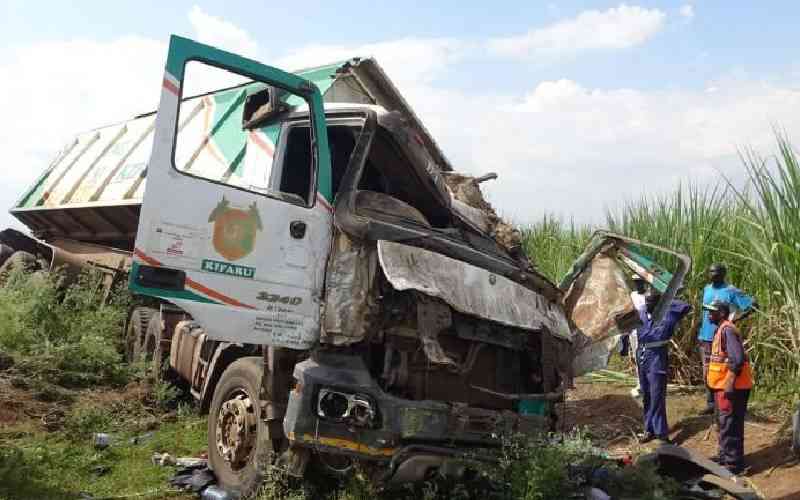
On a continent where road traffic accidents claim lives at an alarming rate, experts and policymakers are highlighting the potential of the African Road Safety Charter. Adopted by African Union (AU) members in January 2016, the Charter provides a common framework for enhancing road safety measures across Africa.
During the eighth Program for Infrastructure Development in Africa Week, held from Nov. 25 to 29 at the AU headquarters in Addis Ababa, Ethiopia's capital, ensuring safer road infrastructure was a focal topic guided by the principles of the African Road Safety Charter.
The 31-article Charter outlines critical provisions for developing and implementing road safety policies and strategies tailored to the continent's unique challenges. These include building safer roads, classifying roads based on use, enforcing minimum vehicle safety standards, and implementing stringent road safety legislation on speed limits, drink driving, and safety gear use.
However, over eight years since its inception, only 12 countries have ratified the Charter, falling short of the minimum threshold of 15 ratifications for it to take effect. Experts and policymakers argue that the slow progress poses significant risks, as road fatalities across Africa have surged by 17 percent since 2010, contrasting global trends where road traffic-related fatalities fell by 5 percent since 2010, according to a recent United Nations (UN) report.
ALARMING REALITY OF ROAD SAFETY IN AFRICA
Binta Sako, a violence and injury prevention technical officer at the World Health Organization (WHO) Africa, told Xinhua in a recent interview that Africa bears a disproportionate share of global road traffic fatalities, underscoring the severity of the issue, particularly given the continent's limited healthcare infrastructure that exacerbates the devastating toll of road crashes.




Despite accounting for 15 percent of the global population and owning merely 3 percent of the global vehicle fleet, the African continent recorded one-fifth of global road traffic deaths, according to the WHO's latest status report on road safety in Africa. The report noted that Africa continues to have the most perilous roads globally, placing immense strain on the continent's economy and public health systems. In 2021 alone, nearly 250,000 lives were lost on African roads.
Sako emphasized that Africa's road safety crisis transcends statistics, describing it as "a pressing human tragedy" that demands targeted interventions. She underscored the abrupt nature of road crashes resulting in devastating losses for families and communities grappling with long-term emotional and economic repercussions.
With no country in Africa currently having laws that meet the best practice standards for the five key behavioral risk factors in road safety -- speeding, drink-driving, non-use of motorcycle helmets, seatbelts, and child restraints -- experts and policymakers view the African Road Safety Charter as a vital framework to address these challenges and promote safer roads across the continent.
UNIFIED APPROACH TO ROAD SAFETY
The AU Assembly, comprised of African heads of state and government, adopted the 31-article charter as a framework for enhancing road safety across the continent. Upon its adoption, African leaders expressed "deep concern" over the "inordinately high" rate of road crashes and their substantial socioeconomic impact, with costs nearing 2 percent of gross national product (GDP), according to the AU.
According to Amani Abou-Zeid, AU Commissioner for Infrastructure and Energy, the adoption of the Charter reflects a growing political will to save lives on Africa's roads. Yet, over eight years later, it has not achieved the necessary threshold of ratification.
With Namibia becoming the first country to ratify the charter in February 2019, the other 11 African countries to follow suit include Benin, Central African Republic, Ethiopia, Mali, Morocco, Nigeria, Niger, Senegal, Eswatini, Togo, and Uganda.
Experts argue that ratifying the charter, eventually leading to its effective implementation, is essential for implementing a cohesive continental road safety framework that can help reduce road crashes. They mainly attributed the charter's slow ratification progress to an apparent lack of understanding of the magnitude of road safety-related challenges in Africa and limited political commitment.
Placide Badji, an economic affairs officer at the UN Economic Commission for Africa's connectivity and infrastructure development division, said with road safety challenges becoming a persistent public health concern across Africa, concerted efforts and enough resources are needed to be allocated for the road safety agenda at the national, regional, and continental levels.
Stay informed. Subscribe to our newsletter
"What we realized is that the bulk of the countries over the continent don't even have the fundamentals of road safety," Badji told Xinhua in a recent interview, emphasizing the charter's crucial importance as it offers a unified framework for road safety protocols. "Political commitment is the first challenge. It seems that there is a lack of understanding of the magnitude of the problem -- how this is hampering countries' GDP, as well as their social and economic development."
LEARNING FROM EARLY ADOPTERS
Despite these challenges, promising examples from early adopters of the African Road Safety Charter highlight its potential as a transformative framework. Ethiopia, among the first to ratify the charter, considers it instrumental in enhancing road safety management.
Although Ethiopia has a low per capita car ownership rate, fatal traffic accidents remain prevalent, often linked to reckless driving, weak road safety systems, and inadequate enforcement of safety regulations. Experts believe that fully implementing the charter can complement national legislation and address systemic challenges at both national and continental levels.
Yohannis Lemma, chief executive officer of Road Safety Education and Capacity Building at Ethiopia's Road Safety and Insurance Fund Service, stressed that understanding the economic, social, and psychological impacts of road crashes is key to fast-tracking the charter's swift entry into implementation.
"In order to address road traffic challenges in Africa in a practical and meaningful way, countries need to develop a common platform that can be used as a policy guideline. Hence, the adoption and implementation of the African Road Safety Charter is an important step to assess the progress and gaps related to road safety on a wider continental level," Lemma said.
While Kenya has yet to sign or ratify the charter, efforts are underway to advance the process. Duncan Kibogong, National Transport and Safety Authority (NTSA) deputy director in charge of road safety, told Xinhua that active efforts are ongoing to navigate the necessary steps for ratification.
Underscoring the need for collaboration with various agencies to expedite the adoption of the charter, Kibogong said concerted efforts are underway to facilitate the charter's ratification process, involving multiple reviews and approvals by relevant bodies. He said such structured processes are essential to ensure that the charter is thoroughly integrated into national policy.
CALL FOR CONCERTED EFFORTS TO SAFER ROADS
Bright Oywaya's story is a poignant reminder of the devastating human and socioeconomic toll of Africa's road safety crisis. After a road crash some 27 years ago left her permanently wheelchair-bound, Oywaya became a passionate advocate, dedicating her life to raising awareness about road safety and its far-reaching impacts on victims and their families.
As a Kenyan road safety advocate and former NTSA vice chair, Oywaya called for a paradigm shift, urging governments and stakeholders to view road safety as a critical investment rather than an expense.
"Enhancing road safety is not just about regulations, it is about saving lives and fostering healthier communities. Every life lost and resources damaged to road crashes represent untapped potential and a tragedy that can be prevented," Oywaya said.
Patrick Kinyanjui from the Global Alliance of NGOs for Road Safety Africa acknowledged the critical role of civil society organizations in promoting the charter's ratification by AU members, citing Senegal's recent milestone as the most recent AU member to deposit its instrument of ratification with the AU Commission in September 2023.
Stressing that more efforts are needed to amplify the charter's significance and spotlight Africa's road safety crisis, Kinyanjui highlighted the importance of supporting the AU in raising awareness about the issue and working collaboratively to improve the socioeconomic conditions for Africa's 1.4 billion people.